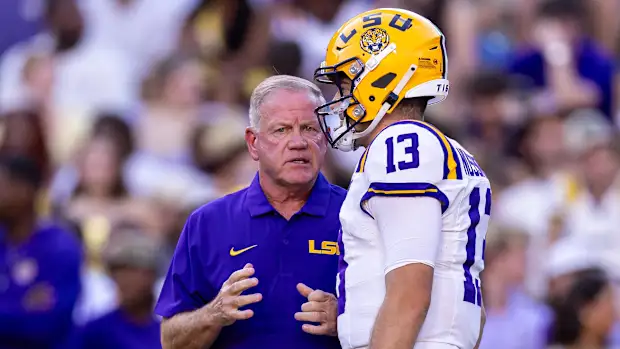Arch Manning’s Legacy at Texas Still Unproven as LSU’s Brian Kelly Challenges the Young Quarterback’s Readiness for the Spotlight
The world of college football is no stranger to hype, especially when it comes to the Manning family. Arch Manning, the latest prodigy from football’s royal lineage, has carried immense expectations since his high school days. Now the quarterback for the Texas Longhorns, Manning finds himself under the microscope as he navigates the pressures of leading one of the most storied programs in the sport. Yet, despite the buzz surrounding his potential, LSU Tigers head coach Brian Kelly recently cast doubt on whether the young signal-caller has truly proven himself at the collegiate level.
Kelly’s comments came during a press conference ahead of LSU’s upcoming matchup with Texas, where he was asked about Manning’s development and whether he considers him a legitimate threat in the SEC. “He’s got all the tools, no question,” Kelly acknowledged. “But until you go out there and do it consistently against the best defenses in the country, there’s always more to prove. This league doesn’t care about your name or your high school highlights. It’s about what you do when the lights are brightest.”
The remarks, while not overtly critical, serve as a reminder that Manning’s journey is far from complete. For a player whose every throw is dissected and whose last name alone commands attention, the road to establishing himself as a true elite quarterback is paved with challenges. So far, Manning’s opportunities to start have been limited, with Quinn Ewers holding the primary role for much of the past two seasons. When Manning has seen the field, he’s shown flashes of brilliance—arm talent, poise in the pocket, and the ability to extend plays with his legs—but questions remain about his consistency and ability to perform against top-tier competition.
Part of the skepticism stems from the fact that Manning has yet to face a gauntlet of elite SEC defenses. The Longhorns’ transition into the conference means that the level of competition is about to skyrocket, and how Manning responds will define his legacy. Kelly’s LSU squad, known for its aggressive defensive schemes and NFL-caliber talent, will be one of the first major tests of Manning’s readiness. If he struggles, critics will pounce. If he thrives, the narrative shifts dramatically in his favor.
There’s also the weight of history hanging over Manning’s career. His uncles, Peyton and Eli, are two of the most accomplished quarterbacks in NFL history, and his grandfather, Archie, was a legend in his own right. The comparisons are inevitable, and while they bring attention, they also bring an almost unfair level of scrutiny. Every incomplete pass, every interception, every loss will be magnified simply because of the name on the back of his jersey.
Texas head coach Steve Sarkisian has been careful in managing Manning’s progression, emphasizing the need for patience. “Arch is a competitor, and he wants to be out there every snap,” Sarkisian said earlier this season. “But we’re focused on his long-term growth. This isn’t about one game or one season—it’s about building a player who can lead this program for years to come.”
That approach makes sense from a developmental standpoint, but in the cutthroat world of college football, where fanbases demand immediate success, patience can wear thin quickly. Texas supporters, hungry for a return to national prominence, are eager to see if Manning is the savior they’ve been waiting for. The Longhorns haven’t won a national championship since 2005, and while they’ve shown improvement under Sarkisian, the program’s ceiling ultimately hinges on quarterback play.
Kelly’s comments, then, can be seen as both a challenge and a psychological ploy. By publicly questioning Manning’s readiness, he may be attempting to plant seeds of doubt in the young quarterback’s mind ahead of their showdown. Mental toughness is just as important as physical ability in college football, and how Manning responds to external noise will be telling.
For his part, Manning has remained outwardly unfazed. In interviews, he’s consistently deflected praise, focusing instead on team goals and his own daily improvement. “I’m just trying to get better every day and help this team win,” Manning said after a recent practice. “The outside stuff doesn’t matter to me. I know what I’m capable of, and so do my teammates.”
That quiet confidence is a hallmark of the Manning family, and if Arch can channel even a fraction of the poise that made his uncles champions, Texas will be in good hands. But until he delivers in a high-stakes, nationally televised showdown against a defense like LSU’s, the doubts will linger.
The 2024 season presents Manning with his biggest opportunity yet. With Ewers moving on to the NFL, the starting job is his to lose. The schedule is brutal, featuring not only LSU but also matchups against Georgia, Oklahoma, and a slew of other SEC powerhouses. By the end of the year, the conversation around Manning will either be one of validation or skepticism.
Brian Kelly’s words may have been a subtle jab, but they underscore a larger truth in college football: potential only matters until the games begin. Arch Manning has the pedigree, the talent, and the platform to become a superstar. Now, he has to go out and prove it.
The spotlight has never been brighter. The stage has never been bigger. And as the season approaches, all eyes will be on the young quarterback from Texas, waiting to see if he can rise to the occasion—or if the pressure will prove too much. One thing is certain: the legend of Arch Manning is still being written, and the next chapter could define his career.



